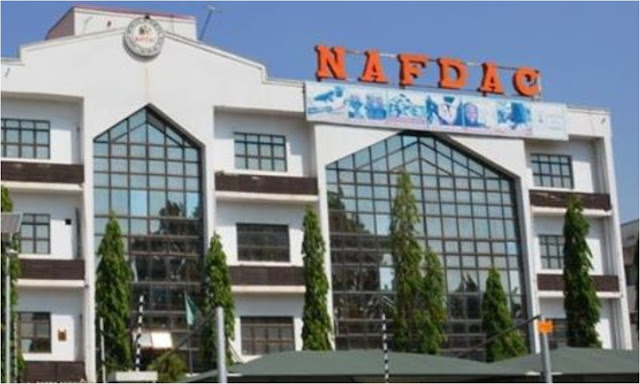In a decisive move to protect public health, the National Agency for Food and Drug Administration and Control (NAFDAC) has sealed an illegal herbal medicine production facility in Kaduna State, Nigeria. The facility, identified as SHIFA’UNNUR, is located in Mararaba Jos, Igabi Local Government Area. The operation, led by NAFDAC’s Principal Regulatory Officer, Mr. Shamsuddeen Mani, was carried out following credible intelligence that exposed the facility’s non-compliance with regulatory standards. The shutdown marks a significant step in NAFDAC’s ongoing efforts to combat the proliferation of substandard and unregistered products that pose serious risks to public health. This article delves into the details of the operation, the implications of the discovery, and NAFDAC’s broader mandate to ensure the safety, quality, and efficacy of consumable products in Nigeria.
The Operation: A Swift Response to Credible Intelligence
The raid on SHIFA’UNNUR was executed with precision and urgency, reflecting NAFDAC’s commitment to safeguarding Nigerians from the dangers of unregulated products. According to Mr. Shamsuddeen Mani, the operation was prompted by actionable intelligence that revealed the existence of an illegal herbal medicine production facility operating in violation of established regulations. The facility, located in a relatively obscure part of Mararaba Jos, was found to be producing herbal medicines under conditions that fell far below the minimum operational standards required by NAFDAC.
Mani, who led the enforcement team, described the conditions at the facility as “alarming.” He noted that the equipment used in the production process was substandard, and the setup itself was unhygienic, raising serious concerns about the safety of the products being manufactured. “We acted swiftly based on credible intelligence and cracked down on an illegal herbal medicine facility in Mararaba Jos. It’s alarming that all the equipment used in the unhygienic and hidden setup were substandard. These products pose serious health risks as their safety, quality, and efficacy cannot be guaranteed,” Mani stated during a press briefing following the operation.
The discovery of the facility underscores the challenges faced by regulatory agencies like NAFDAC in monitoring and controlling the production of herbal medicines, which have become increasingly popular in Nigeria. The unregulated nature of such facilities poses a significant threat to public health, as consumers are often unaware of the risks associated with products that lack proper oversight.
Seizure and Destruction of Unregistered Products
As part of the enforcement action, NAFDAC seized unregistered herbal products valued at approximately N5 million. These products, which were being produced and distributed without NAFDAC’s approval, were deemed unfit for consumption due to their questionable safety, quality, and efficacy. Mani announced that the seized products would be destroyed to prevent them from entering the market and endangering unsuspecting consumers.
The seizure of such a significant quantity of unregistered products highlights the scale of the illegal operation and the potential harm it could have caused if left unchecked. NAFDAC’s decision to destroy the products aligns with its mandate to eliminate substandard and counterfeit goods from circulation, ensuring that only safe and approved products are available to the public.
The facility itself has been sealed pending further investigation, signaling that NAFDAC is not only focused on immediate enforcement but also on uncovering the full extent of the operation’s activities. The investigation will likely explore the supply chain, distribution networks, and any other parties involved in the production and sale of these unregistered products. This thorough approach reflects NAFDAC’s determination to address the root causes of regulatory breaches and prevent future violations.
The Dangers of Unregulated Herbal Medicines
The proliferation of unregulated herbal medicine facilities in Nigeria is a growing concern, as these products often appeal to consumers seeking affordable and traditional remedies for various ailments. However, the lack of oversight in their production can lead to serious health consequences. Unregistered herbal medicines may contain harmful substances, incorrect dosages, or contaminants that can cause adverse reactions, organ damage, or even death in severe cases.
Mani emphasized that the substandard equipment and unhygienic conditions at SHIFA’UNNUR made it impossible to guarantee the safety of the products being produced. Without proper testing and quality control measures, these products could expose consumers to a range of health risks, including allergic reactions, toxicity, and ineffective treatment of medical conditions. Moreover, the absence of NAFDAC registration means that the facility was operating outside the legal framework designed to protect consumers, further compounding the risks.
The popularity of herbal medicines in Nigeria is driven by cultural beliefs, accessibility, and the perception that natural remedies are safer than conventional pharmaceuticals. However, this perception can be misleading when products are manufactured in unregulated environments. NAFDAC’s crackdown on SHIFA’UNNUR serves as a reminder that even herbal medicines must meet stringent regulatory standards to ensure their safety and efficacy.
NAFDAC’s Mandate and Enforcement Efforts
NAFDAC, established under the National Agency for Food and Drug Administration and Control Act, is tasked with regulating and controlling the manufacture, importation, exportation, distribution, advertisement, sale, and use of food, drugs, cosmetics, medical devices, chemicals, and packaged water in Nigeria. The agency’s primary goal is to safeguard public health by ensuring that only safe, high-quality products are available to consumers.
The shutdown of the SHIFA’UNNUR facility is a testament to NAFDAC’s proactive approach to enforcement. Mani reiterated that the agency is empowered by law to pursue violators and clamp down on all forms of regulatory breaches. “NAFDAC will continue to pursue violators and clamp down on all forms of regulatory breaches,” he stated, underscoring the agency’s zero-tolerance policy for non-compliance.
This operation is part of a broader effort by NAFDAC to address the growing challenge of counterfeit and substandard products in Nigeria. The agency has intensified its surveillance and enforcement activities in recent years, targeting illegal manufacturing facilities, unregistered products, and unscrupulous vendors. These efforts are critical in a country where the demand for affordable healthcare solutions often leads to the proliferation of substandard goods.
Challenges in Regulating the Herbal Medicine Sector
The regulation of herbal medicines in Nigeria presents unique challenges due to the sector’s complexity and cultural significance. Unlike conventional pharmaceuticals, which are subject to rigorous clinical trials and standardized production processes, herbal medicines often rely on traditional knowledge and practices that may not align with modern regulatory frameworks. This creates a gray area where unscrupulous operators can exploit consumer trust and regulatory gaps to produce and sell substandard products.
The SHIFA’UNNUR case highlights several key challenges faced by NAFDAC in regulating the herbal medicine sector:
Lack of Registration: Many herbal medicine producers operate without registering their products or facilities with NAFDAC, making it difficult for the agency to monitor their activities. The absence of registration means that these products are not subject to quality control checks, increasing the risk of harm to consumers.
Substandard Production Practices: The use of substandard equipment and unhygienic conditions, as observed at SHIFA’UNNUR, is a common issue in illegal manufacturing facilities. These conditions compromise the safety and efficacy of the products, putting consumers at risk.
Consumer Awareness: Many Nigerians are unaware of the risks associated with unregistered herbal medicines and may purchase these products based on affordability or cultural beliefs. Raising public awareness about the importance of NAFDAC registration is critical to reducing demand for substandard goods.
Enforcement Capacity: While NAFDAC has made significant strides in cracking down on illegal operations, the agency faces resource constraints and logistical challenges in monitoring the vast and diverse Nigerian market. Illegal facilities often operate in remote or hidden locations, making detection difficult.
Addressing these challenges requires a multifaceted approach that combines enforcement, public education, and collaboration with traditional medicine practitioners to ensure compliance with regulatory standards.
Implications for Public Health and Safety
The closure of SHIFA’UNNUR and the seizure of N5 million worth of unregistered products have significant implications for public health in Nigeria. By removing these potentially harmful products from circulation, NAFDAC has taken a critical step toward protecting consumers from the risks associated with substandard herbal medicines. However, the incident also highlights the need for sustained vigilance and stricter enforcement to prevent similar operations from emerging in the future.
The health risks posed by unregistered products cannot be overstated. Consumers who rely on these medicines for treatment may experience worsening health conditions, adverse reactions, or delayed access to effective medical care. In a country like Nigeria, where access to healthcare is already limited for many, the proliferation of substandard products exacerbates existing challenges and undermines public trust in the healthcare system.
NAFDAC’s actions also send a strong message to other illegal operators in the herbal medicine sector. By publicly announcing the shutdown and destruction of seized products, the agency is signaling its commitment to enforcing regulations and holding violators accountable. This could deter other unscrupulous producers from operating outside the legal framework, although sustained efforts will be needed to maintain this momentum.
The Broader Context: Nigeria’s Battle Against Substandard Products
The SHIFA’UNNUR case is just one example of the broader challenge of combating substandard and counterfeit products in Nigeria. The country has long grappled with the influx of fake drugs, unregistered herbal remedies, and adulterated food products, which pose significant risks to public health. NAFDAC has been at the forefront of this battle, implementing measures such as product authentication technologies, public awareness campaigns, and partnerships with international organizations to strengthen its regulatory framework.
However, the scale of the problem requires a collaborative effort involving government agencies, law enforcement, healthcare professionals, and the public. Consumers play a critical role in this ecosystem by choosing to purchase only NAFDAC-registered products and reporting suspicious goods to the agency. By fostering a culture of compliance and vigilance, Nigeria can reduce the prevalence of substandard products and improve overall public health outcomes.
Looking Ahead: Strengthening Regulation and Public Awareness
The shutdown of the SHIFA’UNNUR facility is a significant victory for NAFDAC, but it also underscores the need for ongoing efforts to strengthen regulation and raise public awareness. Moving forward, NAFDAC can take several steps to address the challenges posed by illegal herbal medicine production:
Enhanced Surveillance: Increasing the frequency and scope of inspections, particularly in rural and semi-urban areas where illegal facilities often operate, can help NAFDAC identify and shut down unregulated operations more effectively.
Public Education Campaigns: Launching targeted campaigns to educate consumers about the dangers of unregistered herbal medicines and the importance of checking for NAFDAC registration numbers can reduce demand for substandard products.
Collaboration with Traditional Medicine Practitioners: Engaging with traditional medicine practitioners to promote compliance with regulatory standards can help bridge the gap between traditional practices and modern regulations, ensuring that herbal medicines are produced safely and effectively.
Strengthening Legal Frameworks: Advocating for stricter penalties for regulatory violations and streamlining the registration process for herbal medicine producers can deter illegal operations and encourage compliance.
Leveraging Technology: Utilizing digital tools, such as mobile apps for product verification and real-time reporting of suspicious activities, can enhance NAFDAC’s ability to monitor the market and respond to violations promptly.
Conclusion
The sealing of the SHIFA’UNNUR herbal medicine facility in Kaduna State is a testament to NAFDAC’s unwavering commitment to protecting public health in Nigeria. By acting swiftly to shut down an illegal operation and seize N5 million worth of unregistered products, the agency has taken a critical step toward safeguarding consumers from the dangers of substandard herbal medicines. The operation highlights the broader challenges of regulating the herbal medicine sector in Nigeria, where cultural practices, economic pressures, and regulatory gaps create opportunities for unscrupulous operators.
As NAFDAC continues its fight against substandard and counterfeit products, the agency’s success will depend on its ability to combine enforcement with public education and collaboration with stakeholders. The SHIFA’UNNUR case serves as both a warning to violators and a call to action for consumers to prioritize safety when purchasing herbal medicines. By sustaining its efforts and addressing the root causes of regulatory breaches, NAFDAC can strengthen Nigeria’s healthcare system and ensure that all products meet the highest standards of safety, quality, and efficacy.






